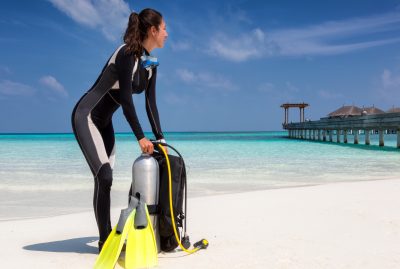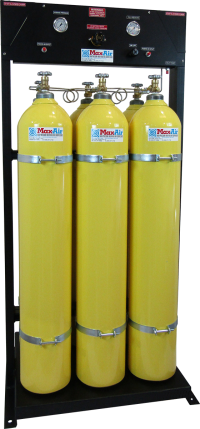
To ensure your safety, you need to make sure all of your gear is safe to use before even dropping into the water. The first step in this regard is often the refilling of your scuba tank.
In this article, we’ll show you how to safely use an air compressor to do just that in 7 simple steps.
1. Check Tank Compliance
Scuba tanks, or any pressurized tank, needs to be regularly inspected. If the tank is too old or hasn’t been tested recently, don’t use it. It could be faulty, which could lead to a disaster while you’re filling it up or while you’re diving.
2. Release Extra Air
If there’s any extra air in the tank, release it. You don’t want to add more air to a tank unless it has under 10 pounds of pressure worth of air in the tank.
3. Check For Damage or Loose Objects
A tank is worthless if it isn’t sealed completely. Give the tank a quick spin and check it for any cracks or holes. Also, give the tank a shake and listen for water or debris in the tank. If you hear any rattling or sloshing water, discard the tank immediately.
You want to be extra-diligent in this step because by the time the diver realizes the tank is leaking air it may be too late.
4. Give the Tank a Cold Bath

You can also spot holes and cracks in the tank more easily if you notice air bubbles spilling out from the sides of the scuba tank.
5. Set Up the Compressor
Your compressor needs to be configured specifically for the tank you’re filling up so check all of the requisite gauges and meters, and make sure everything looks correct.
Make sure the automatic shut-off is also working.
6. Attach the Yoke to the Scuba Tank
Here, all you have to do is attach the compressor’s yoke to the tank’s valve. Make sure the connecting points of both components are clear of dirt and debris. You don’t want to be sucking in bad air once the tank is ready.
7. Fill the Tank
Turn the compressor on and let it fill up the tank. Monitor the gauges and make sure the automatic shut-off mechanism on the compressor is still working. If it malfunctions, you’ll have to turn off the compressor yourself.
Need an Air Compressor?
With an air compressor, filling up scuba tanks is a walk in the park. Of course, if you don’t have one already, you’ll need to get one.
If you run a scuba business, you should check out our air compressor offerings. Having a compressor of your own will allow you to avoid those tank fill-up fees from third parties and save you a ton of money in the long run.
